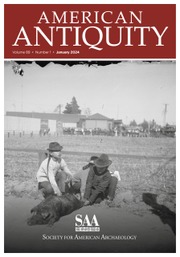Article contents
A Perspective on Ethics and the Reburial Controversy
Published online by Cambridge University Press: 20 January 2017
Abstract
It is our opinion that archaeologists have no inherent right of access to human remains, grave goods, or objects of cultural heritage; that respecting diverse cultural views does not amount to an abdication of academic freedom; that historically archaeologists have been unanthropological in their approach to living populations and inconsistent in their treatment of indigenous peoples; and that archaeologists are fighting a losing battle when they ignore public opinion and clash with indigenous groups in the name of science. We offer some guidelines that we feel will alleviate much of the current tensions between archaeologists and indigenous peoples. A professional ethic must be devised that is consciously anthropological, values the rights of those studied and their cultural descendants in their own terms, and places academic pursuits in their proper context.
Resumen
Según indican las declaraciones recientes de la Sociedad Americana de Arqueología (SAA) y de otras fuentes, las cuestiones de repatriación y de re-entierro son serias. Son asuntos que la SAA quisiera resolver para beneficio de la profesión. Desgraciadamente, la profesión parece decidida a retener sistemas pasados de moda en la conducción de estudios arqueológicos en vista de los cambios que existen hoy en día, incluyendo una insistencia a los derechos de acceso a objetos de estudio. En nuestra opinión, los arqueólogos no tienen derecho inherente al acceso a restos humanos, objetos encontrados en sepulturas ni a objetos de herencia cultural. El hecho de respetar los diversos puntos de vista culturales no significa el negar la libertad académica. Historicamente, los arqueólogos han procedido de una forma anti-antropológica en su enfoque de poblaciones existentes y han sido inconsistentes en su trato de poblaciones indígenas. Los arqueólogos estan perdiendo la batalla al ignorar la opinión pública y al chocar con grupos indígenas en nombre de la ciencia. Se debe crear una ética profesional que tenga una conciencia antropológica, que valore los derechos de los sujetos estudiados y sus decendientes culturales tales como son, y que aceptan los estudios académicos como una expresión de la cultura euroamericana y no como a los progenitores de una verdad universal.
- Type
- Forum
- Information
- Copyright
- Copyright © Society for American Archaeology 1993
References
References Cited
- 25
- Cited by




